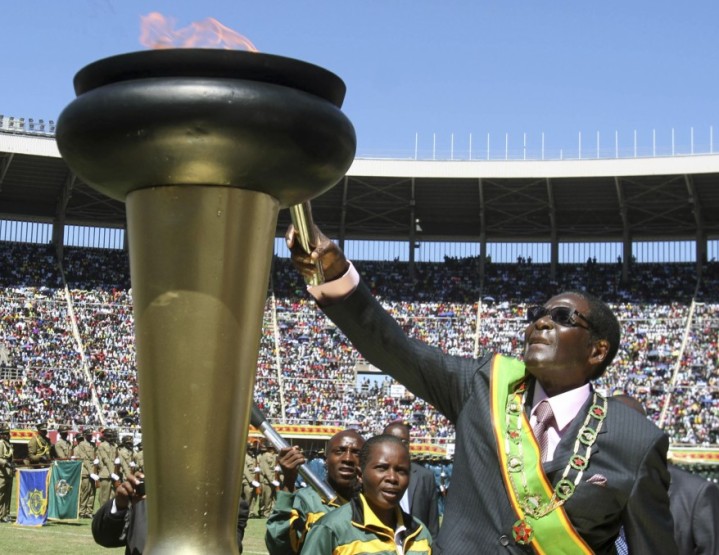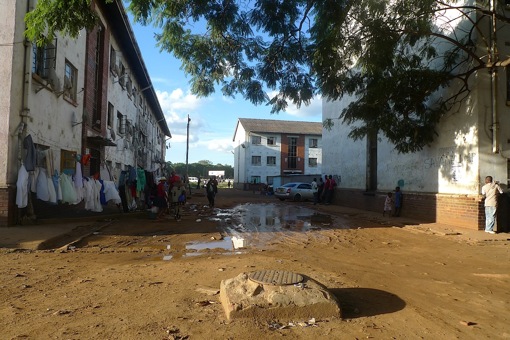IT is a hectic Thursday morning in the sprawling Mbare township of Harare and the sweltering heat scorches fiercely on the overcrowded suburb’s residents as the sun rises.
Report by The Zimbabwe Independent‘s Herbert Moyo
The actual day is April 11 2013 – yesterday – exactly a week before Zimbabwe marks the 33rd anniversary of Independence from British colonial rule but there is nothing in the air to suggest the country is approaching such a momentous occasion which is only being hyped in the state-controlled media daily through advertorials and songs.

The people appear oblivious of Independence Day which has increasingly become a drab occasion that instead of making them proud of self-rule reminds them of the ravages of misrule surrounding them.
In place of joy and expectations about the looming celebrations, the air in Mbare rather reeks of a suffocating stink of human waste, decaying garbage and a grating blast of music from squalid apartments whose trademark is now dilapidation and filth.
Still in their state of disrepair and griminess, they are homes to peace-loving and law-abiding Zimbabweans whose dreams of better lives promised during the liberation struggle have been betrayed and shattered by their yesteryear liberators.
Compared to the air of jubilation and hope which gripped Mbare after President Robert Mugabe and Zanu PF swept to victory in 1980, the situation in Harare’s most famous township is now a monument to national failure.
The poverty and squalor symbolises and reflects shattered dreams and betrayal.
A day before Independence, Mugabe had promised: “Tomorrow is thus our birthday, the birth of a great Zimbabwe, and the birth of its nation.”
Even if the words “Black Empowerment” are inscribed right next to the Zanu PF mantra of “Unity, Peace and Development” on the Magaba Flats, the reality inside them speaks of disempowerment, poverty and suffering. Magaba is part of the collection of dilapidated flats, including Shawasha and Matapi, where throngs of this township’s most enterprising yet poor people reside.

Climbing the stairs, one is almost knocked over by the mad rush of children stampeding downwards in the opposite direction almost gasping for fresh air and greater space in the outside world which offers them only false comfort.
Water leaks from a room on the first floor and cascades down below to the basement where a dreadlocked young man engages in the seemingly futile task of scooping it away.
Looking at the lad’s endeavours the visitor immediately recalls the army of vendors selling wares on every pathway in the township, a common phenomenon across Zimbabwe.
The young man’s grim, but vain determination encapsulates the general spirit of fortitude of millions of Zimbabweans, seemingly abandoned by their political leaders and left to their own devices to fight herculean struggles against poverty and squalor.
The young man is 26-year old Francis Shumba and he has lived in Matapi flats since 1995. Shumba has known no other president since birth except Mugabe who came to power 33 years ago promising to create a democratic and prosperous society with equal opportunities for all.
“We know that we have councillors, MPS and a black government,” Shumba says. “All my life I have only known a black independence government but I have never seen any one of these top leaders around this place where I share one room with four other family members. The only time they come here is when they are being taken to Stodart Hall in coffins during parades before burial at the Heroes Acre.”
Shumba’s life is a tale of personal struggles and sacrifices.
For him, life appears “solitary, poor, nasty, brutish, and short” – the Hobbesian way. Shumba’s experiences are a microcosm of the struggles of many ordinary Zimbabweans.
“We go for long periods without water forcing us to rely on one borehole which we often share with people from Matapi and Shawasha flats. When the pressure is too much women and children fetch water from the polluted Mukuvisi River,” Shumba says.
Besides water shortages, there are frequent power outages and a general chronic lack of social service delivery.
From being a relative prosperous country, Zimbabwe is now wedged in political instability and economic doldrums. The country has been ruined by extended periods of political repression and economic mismanagement.
It is nowadays the Zimbabwe in which, according to the late prolific writer Dambudzo Marechera, “every morsel of sanity is snatched from you in the house of hunge
